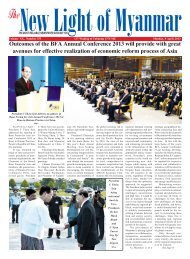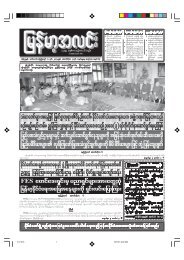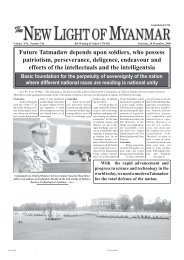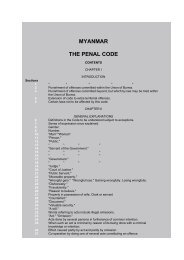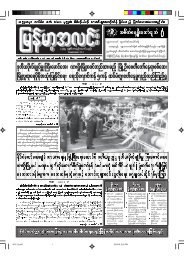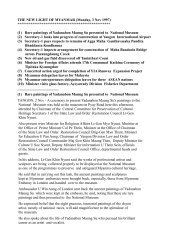Changing Buddhist Practice in Burma - Online Burma Library
Changing Buddhist Practice in Burma - Online Burma Library
Changing Buddhist Practice in Burma - Online Burma Library
Create successful ePaper yourself
Turn your PDF publications into a flip-book with our unique Google optimized e-Paper software.
hence a <strong>Buddhist</strong> <strong>in</strong>dividual is thought of as a non-self <strong>in</strong>dividual. An<br />
<strong>in</strong>dividual thus is seen as an autonomous and discrete atomic element, and <strong>in</strong><br />
their collectives they constitute a k<strong>in</strong>d of 'atomic pluralism' 12 <strong>in</strong> which they are<br />
bound together and l<strong>in</strong>ked to each other by collective moral responsibility <strong>in</strong><br />
accordance with the teach<strong>in</strong>g of Buddha. Theoretically the <strong>Buddhist</strong> polity<br />
state can be analysed <strong>in</strong> terms of a 'total phenomenon' (Tambiah 1976: 35),<br />
consist<strong>in</strong>g of elementary relationships between the <strong>in</strong>dividual (conceptualized<br />
<strong>in</strong> <strong>Buddhist</strong> non-self <strong>in</strong>dividuality and meditation) and the prevail<strong>in</strong>g law of<br />
Dharma that governs social and political organizations (as conceptualized <strong>in</strong><br />
<strong>Buddhist</strong> cosmology). 13<br />
<strong>Buddhist</strong> ideas about <strong>in</strong>dividual and society vested <strong>in</strong> its 'total' system have<br />
significant implications <strong>in</strong> the symbolic function of the <strong>Buddhist</strong> polity state,<br />
primarily <strong>in</strong>volv<strong>in</strong>g the roles of k<strong>in</strong>g and monk. 14 Symbolically, the<br />
'construction of social reality' of the polity state reflects a "<strong>Buddhist</strong><br />
cosmology - <strong>in</strong> terms of the periodical creations and resorptions of the universe<br />
as an ordered set of events", which are <strong>in</strong> l<strong>in</strong>e with "the basic philosophical<br />
propositions of the Four Noble Truths, <strong>in</strong> particular the suffer<strong>in</strong>g and its<br />
removal" (Tambiah 1976: 35-6). This pivotal notion of suffer<strong>in</strong>g, embodied <strong>in</strong><br />
Buddhism, is exemplified with<strong>in</strong> the polity <strong>in</strong> the 'pulsat<strong>in</strong>g' pattern of the<br />
k<strong>in</strong>g's power, as the k<strong>in</strong>g alternatively expended his potency (merit), withdrew<br />
<strong>in</strong>to ascetic practice <strong>in</strong> order to recoup his power, and then "emerged from<br />
solitude or from ceremony charged with potency only to demonstrate his<br />
virility and to expend his potency <strong>in</strong> the harem or <strong>in</strong> war" (Bentley 1986: 293).<br />
28







